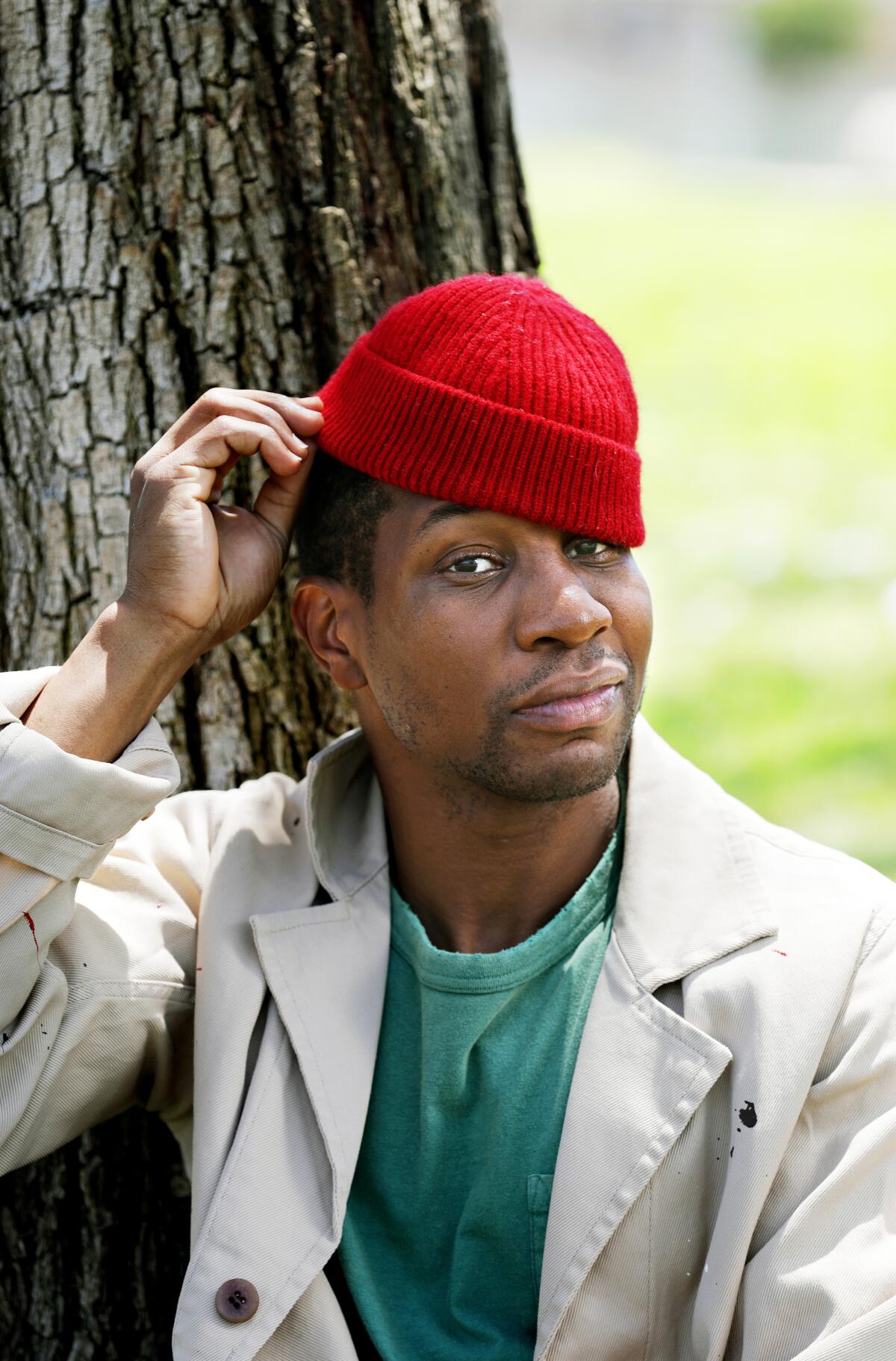Jonathan Majors is living proof ‘trouble don’t last always’

- Share via
After about five years in the business, “Lovecraft Country” star Jonathan Majors is breaking through, big time. But he doesn’t seem to be in danger of losing perspective.
“You don’t really know what’s going on until you look behind you,” he says of his fraught youth and how it shaped who he is today. “My growing up was my growing up; just like anything that’s growing, you’ve got to push through the topsoil in order to see the light of day.”
He was born in Lompoc, Calif., but after his father “disappeared one day,” he moved with his mother and siblings to Texas. Majors grew up outside of Dallas. (He reconnected with his father after 17 years.)
He says, “There were a lot of run-ins, growing up, with authority. The entire time, there was this driving force in me that I knew the circumstances I was in, whether that was homelessness, whether that was in-school suspension, whether that was expulsion; I knew that it wasn’t going to last for long.
“That probably comes from my mother and my grandparents, my family culture: ‘Trouble don’t last always.’ And that’s something that I really believed in, that really propelled me.”
Our panel of veteran TV journalists predict the 2021 Emmy winners. Take your own shot at it with our online polls.
He says the discovery of acting kept him going then: “It did give me refuge, the idea of it. The mystery of it. The comfort that it gave me, and the encouragement.”
He eventually got his MFA from Yale but laughs when remembering: “The Yale School of Drama had an easy job with me, because the hard work was really for the [University of] North Carolina School of the Arts,” where he received his bachelor’s degree.
“You have to realize those guys [UNCSA] were taking a delinquent. A guy who fights, who does not like people as a rule. Who reads a lot, so therefore probably knows what you’re [saying], but is being pushed into a new environment. I kind of clamped down: ‘I’m just gonna do the work.’ Which makes one be proficient as a craftsman, but it doesn’t make them an artist.”
Majors took a rough road, but he has definitively arrived. After catching critics’ eyes in the lauded indie “The Last Black Man in San Francisco,” he stepped into the big time with Spike Lee’s “Da 5 Bloods” and HBO Max’s “Lovecraft Country,” for which he’s now getting serious Emmy buzz. Next, he’ll join the Marvel Cinematic Universe in “Ant-Man and the Wasp: Quantumania” as the he’s-everywhere-and-everywhen villain Kang the Conqueror.
Actors Jonathan Majors and Jurnee Smollett join creator Misha Green in the slyly subversive genre tale.
But so far, “Lovecraft Country” has given the actor his most prominent platform, which is a bit ironic, as it’s in the horror genre, which until recently hadn’t been known for featuring Black creators, stars and stories. The show adapts Matt Ruff’s novel that riffs off ideas of horror pioneer and enthusiastic racist H.P. Lovecraft to tell the story of a Black family in Chicago during Jim Crow that runs afoul of supernatural forces. Costar Jurnee Smollett has said, “As a Black artist, you can be a fan of horror but horror hasn’t always been a fan of us.”
“Absolutely true,” says Majors. “We, as a culture, never really got to participate. That feeling [of being horrified] is a universal human experience. And to not allow a group or entire race to participate in that is in many ways redlining their humanity.
“The entertainment industry is saying Black people can’t be scared like that: ‘They can’t feel that emotion; well, they probably can’t feel this emotion.’ The same thing can be said about love stories. Where’s our ‘Titanic’? The epic-size love story is kept from Black folks.”
Majors says the most important elements of the fantastical show’s Black perspective are down to earth.
“The Black family being so tightknit,” he said of the show’s central characters. “We didn’t make it the Cosbys; it’s a Black family, having internal conflict and not only staying together, moving the family forward.
“Here’s an American tale about this young man, Atticus [a Korean War veteran], coming out of the trenches. This guy’s not blond hair, blue eyes; this is a Black man, and I am a very Black man, nose, lips, skin tone; there’s no confusion here.”
Majors didn’t have to look far for inspiration.
“Both of my grandfathers fought in the Korean War. I dedicate each story I tell to an individual, and in this case, I dedicated it to both Charles Anderson, my maternal grandfather, and Marian Majors, my paternal grandfather. I drew from their strength: ‘You’ve fought in wars. How do you walk? What is your confidence level?’ It’s through the roof. ‘You have seen death, and you’ve conquered it. How do you move through the world?’ ”
“Also there’s this painter, Charles White; I went through the exhibition at the Chicago art institute while I was shooting the pilot. He showed these men: caring, loving. There’s one gesture I looked at [in the drawing ‘Work (Young Worker),’ 1953]. This young man ... hand on his hips ... the amount of try he had inside of him, the amount of ambition he had inside of him. I said, ‘There’s Atticus right there, that’s him.’ He’s strong, he’s vulnerable, he’s present and he’s trying.”
More to Read
From the Oscars to the Emmys.
Get the Envelope newsletter for exclusive awards season coverage, behind-the-scenes stories from the Envelope podcast and columnist Glenn Whipp’s must-read analysis.
You may occasionally receive promotional content from the Los Angeles Times.









